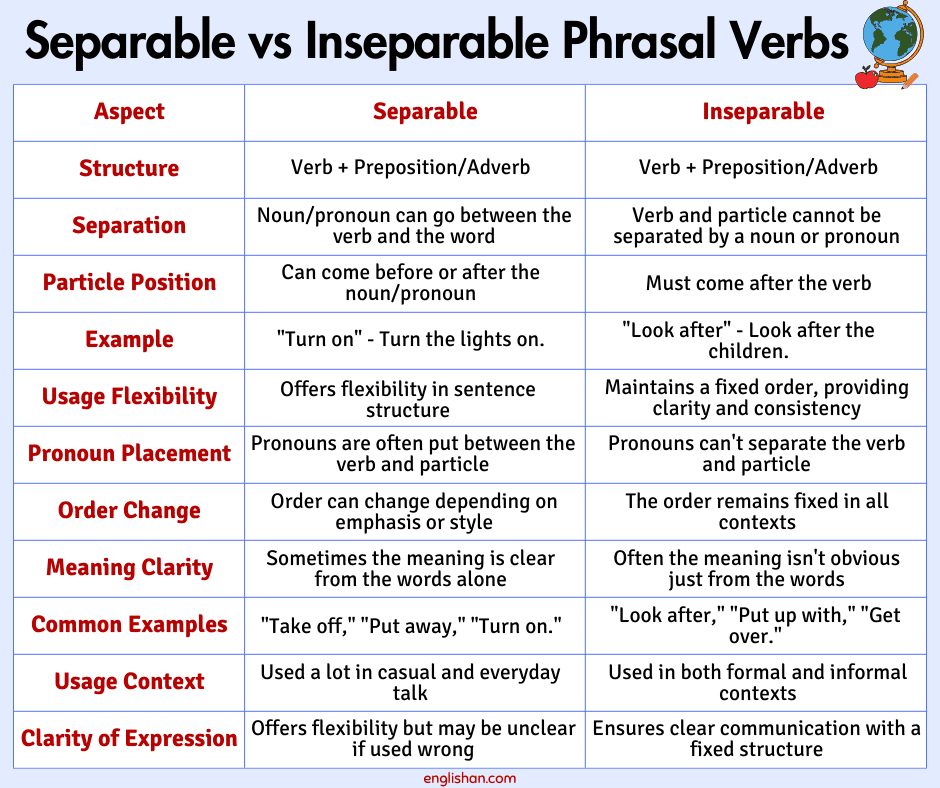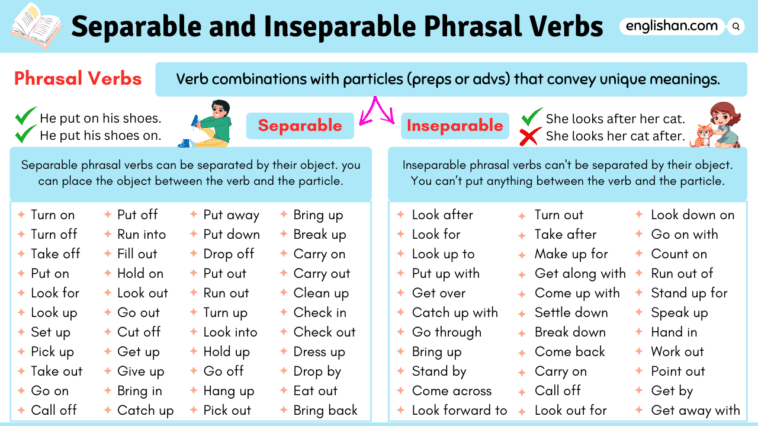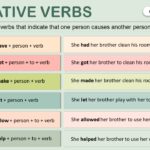Phrasal verbs are combinations of verbs and other words like prepositions or adverbs. They create new meanings. Some phrasal verbs can be separated, meaning you can split the verb and the other word when using them in different tenses. Others cannot be separated and must stay together. Understanding separable and inseparable phrasal verbs is important for clear communication. Let’s explore how to use them correctly in writing and conversations with examples.
What Is a Phrasal Verb?
A phrasal verb is a verb combined with one or more particles, often prepositions or adverbs, that act together as a single unit with a unique meaning. These verbs are frequently used in everyday language and can have various meanings depending on the context. Examples include turn off, pick up, and look forward to. There are two main types of phrasal verbs.
Separable Phrasal Verbs
Separable phrasal verbs are a type of phrasal verb where the verb and the particle (usually a preposition or adverb) can be separated by the object of the verb. In other words, you can place the object between the verb and the particle, or you can keep them together. For example:
A mix of a verb + a particle (like a preposition or adverb).
- Example: turn off, put on.
The object can go between the verb and the particle, or after them both.
Examples:
- ✅ She turned off the lights. / She turned the lights off.
- Verb: turned, Particle: off, Object: the lights.
- ✅ He put on his shoes. / He put his shoes on.
- Verb: put, Particle: on, Object: his shoes.
Remember:
- Both ways of arranging these sentences are correct and mean the same thing.
Inseparable Phrasal Verbs
Inseparable phrasal verbs are those where the verb and the particle (usually a preposition or an adverb) cannot be separated by the object. This means that the object must always come after the particle, and you can’t put anything between the verb and the particle. They often have idiomatic meanings that may not be obvious from the individual words.
A combination of a verb + a particle (like a preposition or adverb).
- The object always comes after the particle.
- Example: look after.
You cannot put the object between the verb and the particle.
Examples
- ✅ She looks after her little brother.
- Verb: looks, Particle: after, Object: her little brother.
- ❌ You cannot say: She looks her little brother after.
Remember:
These phrasal verbs often have special meanings not obvious from the words themselves.

Separable vs Inseparable Phrasal Verbs
Here are the key differences between Separable and Inseparable Phrasal Verbs:
| Aspect | Separable | Inseparable |
|---|---|---|
| Structure | Verb + Preposition/Adverb | Verb + Preposition/Adverb |
| Separation | Noun/Pronoun can go between verb and particle | Verb and particle cannot be split by a noun or pronoun |
| Particle Position | Can come before or after the noun/pronoun | Must come after the verb |
| Example | “Turn on” – “Turn the lights on.” | “Look after” – “Look after the children.” |
| Usage Flexibility | Offers flexibility in sentence structure | Order remains fixed for clarity and consistency |
| Pronoun Placement | Pronouns are often put between the verb and particle | Pronouns can’t separate the verb and particle |
| Order Change | Order can be switched for emphasis or style | The order stays the same in all situations |
| Meaning Clarity | Sometimes the meaning is clear from the words alone | Often the meaning isn’t obvious just from the words |
| Common Examples | “Take off,” “Put away,” “Turn on.” | “Look after,” “Put up with,” “Get over.” |
| Usage Context | Used a lot in casual and everyday talk | Used in both formal and informal settings |
| Communication Clarity | Offers flexibility but may be unclear if used wrong | Ensures clear communication with a fixed structure |

Separable and Inseparable Phrasal Verbs List
List of separable and inseparable phrasal verbs is provided below:
Separable Phrasal Verbs List
| Phrasal Verb | Meaning | Example Sentence |
|---|---|---|
| Turn on | To activate or start | He turns on the light. |
| Turn off | To deactivate or stop | She turns off the TV. |
| Take off | To remove clothing or leave | John takes off his jacket. |
| Put on | To wear clothing or apply | I put on my shoes. |
| Look for | To search for | We look for the keys. |
| Look up | To search for information | She looks up the word. |
| Set up | To establish or arrange | They set up the tent. |
| Pick up | To lift or collect | He picks up the pen. |
| Bring up | To raise or mention | She brings up a good point. |
| Break down | To stop functioning | The car breaks down. |
| Carry on | To continue doing something | We carry on walking. |
| Call off | To cancel | The event is called off. |
| Come across | To find or encounter | I come across an old friend. |
| Put off | To postpone | I put off the meeting. |
| Run into | To encounter unexpectedly | I run into an old classmate. |
| Go through | To experience or endure | She goes through tough times. |
| Hold on | To grasp or wait | Hold on to the railing. |
| Get over | To recover from | He gets over the flu. |
| Look out | To be vigilant or watchful | Look out for cars. |
| Go out | To exit or socialize | They go out for dinner. |
| Take up | To start doing or learning something | She takes up painting. |
| Turn around | To reverse or change direction | The situation turns around. |
| Give up | To surrender or quit | He gives up smoking. |
| Bring back | To return or restore | She brings back the book. |
| Bring in | To introduce or earn | The project brings in profit. |
| Put away | To store or tidy | Put away your toys. |
| Put down | To place or criticize | Don’t put down others. |
| Put out | To extinguish or inconvenience | We put out the fire. |
| Run out | To deplete or exhaust | We run out of milk. |
| Turn up | To increase or appear | He turns up late. |
| Look into | To investigate or examine | The team looks into the issue. |
| Look forward to | To anticipate with pleasure | I look forward to the vacation. |
| Go off | To explode or spoil | The alarm goes off. |
| Hang up | To suspend or end a call | I hang up the phone. |
| Make-up | To reconcile or invent | They make up after the argument. |
| Pick out | To select or identify | She picks out a dress. |
| Stand out | To be distinctive or prominent | His talent stands out. |
| Take off | To become successful or leave quickly | The show takes off. |
| Take out | To remove or obtain | He takes out the trash. |
| Bring up | To raise or nurture | She brings up her children well. |
| Carry out | To execute or perform | The team carries out the plan. |
| Catch up | To reach the same level as | I catch up with my reading. |
| Check out | To investigate or leave a hotel | We check out of the hotel. |
| Cut off | To separate or disconnect | He cuts off the power. |
| Drop off | To deliver or fall asleep | I drop off the package. |
| Fill out | To complete a form | Fill out the application. |
| Get up | To rise or stand | She gets up early. |
| Go on | To continue or proceed | The story goes on. |
| Hold up | To delay or support | The traffic holds up. |
Inseparable Phrasal Verbs List
| Phrasal Verb | Definition | Example Sentence |
|---|---|---|
| Look after | To take care of | I look after my sister. |
| Look for | To search for | I’m looking for my keys. |
| Look up to | To respect or admire | I look up to my parents. |
| Run into | To encounter unexpectedly | I ran into my friend. |
| Put up with | To tolerate | I put up with noisy neighbors. |
| Get over | To recover from | I need to get over this cold. |
| Catch up with | To reach the same level as | I need to catch up with my classmates. |
| Go through | To experience or endure | I’m going through a tough time. |
| Bring up | To raise or mention | My parents brought me up well. |
| Stand by | To support or remain loyal to | I’ll stand by my friend. |
| Come across | To find or encounter | I came across an interesting book. |
| Look forward to | To anticipate with pleasure | I look forward to the weekend. |
| Put off | To postpone | Let’s put off the meeting. |
| Turn out | To result in | It turned out to be a nice day. |
| Keep up with | To stay informed about | I struggle to keep up. |
| Take after | To resemble or inherit traits from | I take after my grandmother. |
| Give in | To surrender or yield | I gave in and let her have it. |
| Make up for | To compensate for | I’ll make up for being late. |
| Get along with | To have a good relationship with | I get along with my coworkers. |
| Take on | To accept or handle a responsibility | I took on the task. |
| Come up with | To produce or suggest an idea | I came up with a plan. |
| Settle down | To establish a stable life | I want to settle down. |
| Break down | To stop functioning | My car broke down. |
| Come back | To return | When will you come back? |
| Carry on | To continue doing something | Let’s carry on despite the rain. |
| Hold on to | To keep or retain | Hold on to your dreams. |
| Call off | To cancel | They called off the meeting. |
| Check in | To register at a hotel or airport | We need to check in. |
| Look out for | To be vigilant or watchful for | Look out for cars. |
| Look down on | To disdain or regard as inferior | Don’t look down on people. |
| Go on with | To proceed with | Let’s go on with our lesson. |
| Count on | To rely on or trust | You can count on me. |
| Get away with | To escape punishment for | He got away with cheating. |
| Run out of | To exhaust the supply of | We ran out of milk. |
| Stand up for | To defend or support | I’ll stand up for what I believe in. |
| Take off | To remove clothing or leave | I’m going to take off my jacket. |
| Look into | To investigate or examine | We need to look into this issue. |
| Deal with | To handle or manage | How do you deal with stress? |
| Think over | To consider carefully | I need to think over your offer. |
| Set up | To establish or arrange | Let’s set up a meeting. |
| Take up | To start doing or learning something | I want to take up painting. |
| Speak up | To voice one’s opinion or concerns | Don’t be afraid to speak up. |
| Hand in | To submit or give something to someone | Please hand in your homework. |
| Turn up | To arrive or appear | She turned up late. |
| Stick to | To adhere to or follow closely | Stick to a healthy diet. |
| Get by | To manage to survive or cope | We’ll get by. |
| Point out | To identify or highlight | Can you point out the features? |
| Work out | To resolve or solve | Let’s work out a solution. |
| Put on | To wear clothing or gain weight | I need to put on a jacket. |
| Hold back | To restrain or withhold | Don’t hold back your feelings. |
Separable and Inseparable Phrasal Verbs Exercises
Choose the correct option for each sentence. Some phrasal verbs are separable, while others are inseparable.
1. She __________ the lights before leaving the room.
- turned off
- turned
- off turned
2. We need to __________ the meeting until everyone arrives.
- put off
- put
- off put
3. They __________ the new project last week.
- came up with
- came
- up came with
4. The car broke down, so we had to __________ a mechanic.
- call for
- call
- for call
5. He __________ the job because it didn’t pay well.
- turned down
- turned
- down turned
6. We need to __________ the documents before submitting them.
- go through
- go
- through go
7. She __________ the letter and felt much better afterward.
- tore up
- tore
- up tore
8. The students __________ the teacher during the class.
- laughed at
- laughed
- at laughed.
9. The company has to __________ some staff due to financial difficulties.
- lay off
- lay
- off lay
10. We need to __________ the issue before it gets worse.
- sort out
- sort
- out sort
11. The manager __________ the proposal during the meeting.
- brought up
- brought
- up brought
12. She __________ her mother’s illness with great courage.
- dealt with
- dealt
- with dealt
Answer Key:
- a) turned off
- a) put off
- a) came up with
- a) call for
- a) turned down
- a) go through
- a) tore up
- a) laughed at
- a) lay off
- a) sort out
- a) brought up
- a) dealt with
FAQs
Q1. What are separable and inseparable phrasal verbs?
Separable phrasal verbs are those where the verb and particle can be separated by an object, while inseparable phrasal verbs are those where the verb and particle cannot be separated by an object.
Q2. How can I identify whether a phrasal verb is separable or inseparable?
One way to identify whether a phrasal verb is separable or inseparable is to check whether the object can be placed between the verb and the particle without changing the meaning of the sentence. If it can, the phrasal verb is separable; if not, it’s inseparable.
Q3. Are there any rules for separable and inseparable phrasal verbs?
While there are general patterns, there’s no hard and fast rule for separable and inseparable phrasal verbs. It’s often a matter of learning and memorizing which phrasal verbs are separable and which are inseparable.
You May Also Like:
- Phrasal Verbs with Let with Sentences
- Phrasal Verbs with Bring with Sentences
- Phrasal Verbs with Come with Sentences and Meanings
- Phrasal Verbs with Get with Sentences and Meanings
- Phrasal Verbs with Make with Sentences and Meanings



